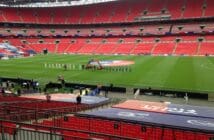Goalkeepers are a funny bunch – often unnoticed, often underappreciated, and often misunderstood. Goalkeeper Watch shines the spotlight – good, or bad – on the men between the sticks.
In the third article of Goalkeeper Watch, the EFL and Premier League fixtures on Saturday 26th December.
‘Christmas is a little different this year’, will be the phrase of 2020’s festive season. When Boris Johnson essentially cancelled Christmas for millions across the south east on December 19th, the feeling across the nation was mixed. Some felt the new Tier Four measures were both inevitable and necessary, and others were a little bit ‘miffed’.
2020 has been a year of loss, hardship, grief, sheer bewilderment, negative amazement, frustration, disappointment, and loneliness for many. Without wanting to trivialise the severity of the COVID-19 Pandemic, many of the aforementioned feelings can be linked to the position of the goalkeeper. Loneliness, hardship, frustration, bewilderment, and disappointment (albeit on a smaller scale) are sentiments that all of those who have stood between the sticks will have experienced at some point.
Due to the craziness of the world we find ourselves living in, consistency has been hard to come by – both in the non-footballing and footballing worlds. There have been some startling results this season across English football, with shocks in terms of league standings prevalent across the divisions. Who would have thought Arsenal would have been as high as 15th on Boxing Day?
And, it’s consistency that sets great football players apart from decent ones. It’s no different for goalkeepers.
Since Karl Darlow stepped in for the injured Martin Dubravka at Newcastle United, he’s put in a string of a notable performances.
It feels like Darlow has been at Newcastle for an eternity, with little reward in his six-year (to date) spell at St James’s Park. However, this is more of an illusion than fact. Upon signing for Newcastle in 2014, Darlow and teammate Jamaal Lascelles were loaned back to Nottingham Forest for the 14/15 season.
When Darlow returned to Tyneside for the 15/16 campaign, he suffered a debut blunder and a relegation from the Premier League, standing in for Rob Elliot and Tim Krul in the final weeks of the season. Things hadn’t gone to plan thus far for Darlow, but the six-foot-three stopper managed to cement his place as the Magpies’ first choice goalkeeper in the 16/17 season – keeping 13 clean sheets as Newcastle returned to the top-flight at the first attempt.

Credit – Laurence Griffiths/Getty Images
After again losing his place to Martin Dubravka in the January of 2018, Darlow had to wait nearly two and a half years to appear again in the Premier League. And it’s fair to say it was worth the wait.
Whilst Newcastle have suffered from inconsistency, Darlow has thrived. Unlike Newcastle as a whole, Darlow’s performances have been all but consistent – or as consistent as they could be considering Darlow has faced the fourth highest number of shots in the division.
Taking into consideration the fact that Darlow had essentially resigned himself to the number two spot at Newcastle upon signing a new five-year deal in September 2020, and the way in which he subsequently took control of the number one spot this term after two years warming the bench, he must be commended.
And Karl Darlow’s performance against Manchester City on Boxing Day was no exception to the list of strong performances he’s put in since the beginning of the season.
The final score at the Etihad read 2-0 to City, but it could – and should – have been more. Darlow made a myriad of excellent saves, denying City with virtually every part of his body. His athleticism is exemplary, and came into good use against Manchester’s blue half, first utilised when he had to palm away a dangerous cross swinging towards the far-top corner of the Newcastle goal – in a manner befitting David Raya against Wycombe Wanderers some weeks ago.
Newcastle’s number one made two good one v one saves during the 90 minutes, and despite using a non-textbook technique to make both saves, it was Darlow’s good positioning that allowed him to make each one – another example of the necessity of his athleticism.
As shown in the photo below, Darlow is all of a foot or so away from De Bruyne as the ball hits his left leg.
The lack of distance between attacker and goalkeeper forces the onus onto the striker (makes them make a decision) and also compensates for the poor technique (the angle is sufficiently narrowed to reduce risk of the shot going through legs).

Credit – BT Sport
Goalkeepers like to talk about ‘big saves’ and ‘brave goalkeeping’, but this doesn’t always come in the form one might expect. For example, taking a positive, high starting position is brave goalkeeping, and a ‘big save’ may be something as simple as making a scoop save (straight down the throat of the goalkeeper, along the floor) in the last minute of a derby match.
And then you have the ‘big [camera]saves’. The ones that do make goalkeepers look like superheroes.
In the dying minutes of the match, with the points already in the bag for Man City, Darlow raced across his goal and flung himself along the slick turf at full length to deny Sergio Aguero a should-have-been tap in. Darlow’s movement across the goal (using cross-steps, an ‘innovation’ of modern goalkeeping practice) had both intent and drive.
Despite practically falling over half way through, the determination Darlow showed in his spreading dive – with the game gone and little to play for – was first class. It showed professionalism, pride in the shirt, and respect for himself.
And it was a very good save.

Credit – Manchester City FC YouTube
![Prost International [PINT]](https://prostinternational.com/wp-content/uploads/2021/08/PINTtFontLogoRoboto1536x78.jpg)


